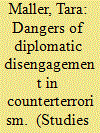| Srl | Item |
| 1 |
ID:
089092


|
|
|
|
|
| Summary/Abstract |
This article assesses the utility of diplomatic sanctions in U.S. counterterrorism efforts. Through an examination of the United States' use of diplomatic sanctions in Afghanistan and Sudan in the 1990s, the article argues that diplomatic disengagement runs the danger of being more costly than beneficial. The blowback from diplomatic disengagement in counterterrorism includes, but is not limited to, the loss of valuable intelligence, a diminished public diplomacy capability, and the potential radicalization of moderates in the target regime. The article also highlights some of the general benefits of diplomatic engagement with problematic regimes and closes with recommendations aimed at enhancing the role of diplomacy in both counterterrorism and non-proliferation foreign policies.
|
|
|
|
|
|
|
|
|
|
|
|
|
|
|
|
| 2 |
ID:
097098


|
|
|
|
|
| Publication |
2010.
|
| Summary/Abstract |
The U.S. government has recently begun to emphasize the need for greater engagement with problem states. Proponents of this approach argue that diplomacy is necessary, even with these regimes. Critics, however, maintain that engagement with these regimes is tantamount to appeasement and signals acceptance of behavior that ought to be condemned. In their view, there is little to be gained by talking to these states. Thus, diplomatic sanctions-or sanctions characterized by political disengagement-are seen as a low-cost means of isolating and delegitimizing regimes.
|
|
|
|
|
|
|
|
|
|
|
|
|
|
|
|